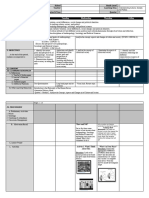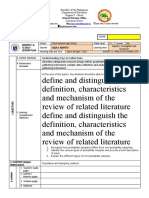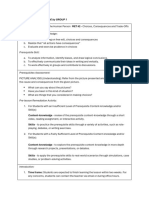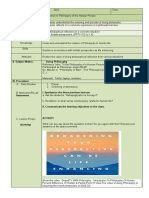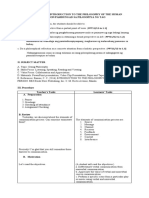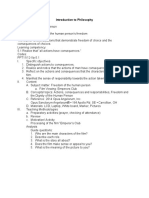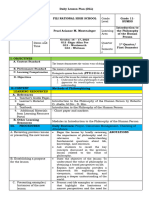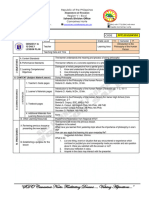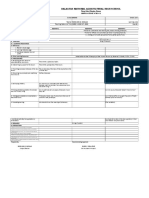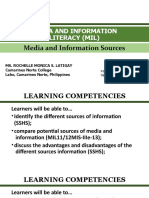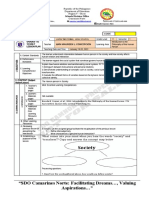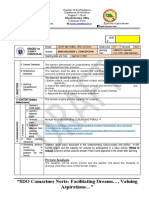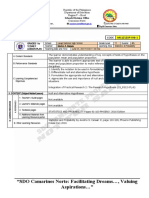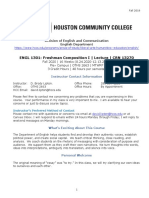DLP-INTRO TO PHILO Q2 Week 1
DLP-INTRO TO PHILO Q2 Week 1
Uploaded by
Ann Maureen ConcepcionCopyright:
Available Formats
DLP-INTRO TO PHILO Q2 Week 1
DLP-INTRO TO PHILO Q2 Week 1
Uploaded by
Ann Maureen ConcepcionOriginal Title
Copyright
Available Formats
Share this document
Did you find this document useful?
Is this content inappropriate?
Copyright:
Available Formats
DLP-INTRO TO PHILO Q2 Week 1
DLP-INTRO TO PHILO Q2 Week 1
Uploaded by
Ann Maureen ConcepcionCopyright:
Available Formats
Republic of the Philippines
Department of Education
Region V – Bicol
Schools Division Office
Camarines Norte
Eco Athletic Field, F. Pimentel Ave., camarines.norte@deped.gov.ph (054) 440-1772/(054) 440-4464
Daet, Camarines Norte DepEd Camarines Norte
5
CODE
School LARAP NATIONAL HIGH SCHOOL Grade Level 11 Semester 1st
GRADES 1 to INTRO TO THE
12 DAILY Learning
Teacher ANN MAUREEN L. CONCEPCION PHILOSOPHY OF HUMAN
LESSON PLAN Area
PERSON
Teaching Date and Time August 22-26,2022
A. Content Standards The learner understands the meaning and process of doing philosophy
B. Performance Standards The learner reflects on a concrete experience in a philosophical way
The learners should be able to
1 Distinguish a holistic perspective from a partial point of view
I. OBJECTIVES
C.Learning Competencies/ PPT11/12-Ia-1.1 Specifically:
Objectives a. Define philosophy
b. Understand why there is a need to philosophize
c. Reflect on one’s personal philosophy in life
What is Philosophy
II. CONTENT (Subject Matter/Lesson)
1. Teacher’s Guide pages
2. Learner’s Materials pages
III. LEARNING RESOURCES
Abella, Roberto D. Introduction to the Philosophy of the Human Person. Quezon City. C & E
A. REFERENCES
3. Textbook pages Publishing, Inc
Source:https://pixabay.com/images/search/p
4. Additional Materials from hilosophy/
Learning Resource portal Source:https://www.peacecorps.gov/educators/resources/story-blind-men-and-elephant
B. Other Learning Resources
A. Reviewing previous lesson or
Establishing a purpose for the
lesson
Teacher will post the OBJECTIVES of the lesson after the review.
Activity 1.0
Pre-test: Directions: Identify what is asked in each given item. Write your answer
in your module notebook.
1. It is the study or discipline that uses human reason to investigate the ultimate
IV. PROCEDURES
B. Presenting causes, reasons and principles which govern all things.
2. The Greek term for philosophy is “philosophia” which means_________.
examples/instances of the 3. It is an activity that requires a person to examine his/her thoughts, feelings,
new lesson and actions and learn from experience.
4. It is a perspective that considers the “bigger picture” when looking at
“SDO Camarines Norte: Facilitating Dreams…, Valuing
Aspirations…”
Republic of the Philippines
Department of Education
Region V – Bicol
Schools Division Office
Camarines Norte
Eco Athletic Field, F. Pimentel Ave., camarines.norte@deped.gov.ph (054) 440-1772/(054) 440-4464
Daet, Camarines Norte DepEd Camarines Norte
problems and situations.
5. It is a perspective that focuses on specific aspects of the situation.
Vocabulary List: Expanding Your Word Wealth
Holistic thinking- refers to a perspective that considers large scale
patterns in systems.
Partial thinking- focuses on specific aspects of a situation.
C. Discussing new concept Reflection requires a person to be willing to examine one’s thoughts,
and practicing new skill #1 feelings, and actions and to learn more about one’s life and
experiences.
The teacher will share a story about the six blind men and the elephant:
Process questions:
What is the moral lesson of the story?
Do you see the truth in partiality or holistically? Explain
Discussion:
The word philosophy comes from two Greek words: philos (love) and
Sophia (wisdom). The ancient Greeks used this term to refer to “love of wisdom”
and they soon applied it to the study or discipline that uses human reason to
investigate the ultimate causes, reasons, and principles which govern all things.
People who engage in philosophy are called philosophers or “lovers of wisdom”.
Among the ancient Greeks, the philosophers became pioneers in various fields of
knowledge such as history, biology, medicine, mathematics, astronomy, and even
physics. It was quite common to hear of ancient philosophers who were “experts”
in various fields of learning.
Why is there a need to philosophize?
The Greek philosopher Plato traced man’s need to philosophize to his sense of
wonder. Whenever we are confronted with an experience, we always wonder how
it came about. Man’s over bounding curiosity drives him to ask questions, some of
which have no definite answers. Where did we come from? Why do we exist? For
D. Discussing new concepts
what purpose were we created? Consider a small child’s curiosity about all the
and practicing new skill #2 things around him, most of which he encounters for the first time. This perspective
drives the need of a philosopher to question, examine, and learn more.
The 15th-century French philosopher Rene Descartes traced the need to
philosophize to doubt. Descartes was famous for rejecting or questioning
established ideas, and he even went as far as doubting his own ideas. His method
of examining ideas and perspectives became the basis of critical thinking and
analysis of sciences.
The 20th-century Swiss-German philosopher Karl Jaspers saw the need to
philosophize because of experience. Jaspers believed that man is often
confronted by the experiences which challenge his ideas and frameworks. Jaspers
called these experiences limit situations, and these are often accompanied by
feelings of helplessness, anxiety, or dread. For jaspers, philosophy provides us a
means to understand adverse or challenging conditions, and to rise above them
and gain new knowledge and perspectives.
Finally, the need to philosophize is driven by the love of wisdom. To love wisdom
is to have an insatiable desire for truth. A philosopher does not seek knowledge to
claim ownership of it, and one who engages in philosophy is not satisfied with
figuring out the answer to a question. He seeks to continue to question, to probe,
and to discuss in order to get the bottom of the things. The philosopher who
exemplified this perspective was Socrates. He gained fame for his curiosity and
“SDO Camarines Norte: Facilitating Dreams…, Valuing
Aspirations…”
Republic of the Philippines
Department of Education
Region V – Bicol
Schools Division Office
Camarines Norte
Eco Athletic Field, F. Pimentel Ave., camarines.norte@deped.gov.ph (054) 440-1772/(054) 440-4464
Daet, Camarines Norte DepEd Camarines Norte
his constant debates with many of the intellectual elite in Greece. Socrates was
famous for having said “ I know that I do not know…” and it is accepting this state
of ignorance that one can begin to learn and understand. By expanding our
knowledge through philosophy, we begin to realize that the learning is unceasing-
there is a lot more to learn and experience in life. Socrates is also recognized for
his motto: “the unexamined life is not worth living”. And nowhere is it more
appropriate to embark on philosophy than in an examination of our own life
Philosophy itself is a distinct area of knowledge with its own goals, concerns,
and ways of doing things. It is often divided into several branches each of which
deals with a particular aspect of phenomena.
Aesthetics-deals with beauty and what make things “beautiful”
Logic-is the branch of philosophy which deals with correct reasoning.
Epistemology-discusses the nature of knowledge and knowing.
Ethics-is the branch which deals with moral questions and dilemmas.
Metaphysics-is a branch of philosophy which deals with questions regarding
reality and existence.
Political philosophy-studies governments and deals with questions of justice,
power and rights and obligations of citizens.
Philosophy of the Human Person-is an area in philosophy that understands the
human person from a philosophical perspective-integrating and synthesizing the
different branches of philosophy and other fields of study to know the truth about
the human person. Holistic thinking refers to a perspective that considers large-
scale patterns in systems. This is often described as looking at the “bigger picture”
when describing and analyzing a situation or problem. A holistic perspective
requires an individual to have an open mindset and an ability to get the general
sense or impression regarding a situation. Partial thinking, on the other hand,
focuses on specific aspects of the situation. The partial view is an important
component of analytical thinking, as an individual focuses on certain areas or
aspects of a problem in order to understand it. Though partial thinking is useful,
philosophy utilizes holistic thinking in making sense of problems and issues related
to the human experience.
How does one engage in reflection?
Reflection requires a person to be willing to examine one’s thoughts,
feelings, and actions and to learn more about one’s life and experiences. One can
reflect on almost any subject. For instance, the moment you wake up you can
already reflect upon the things that you plan to do for the day. This will enable you
to set your daily goals and set you on the path of thinking ways to achieve them.
What are the practical uses of philosophy?
Philosophy has an important place in our daily lives. Engaging in
philosophical reflection leads to the development of beneficial skills that individuals
can apply in everyday situations.Philosophy enables a person to engage in critical
analysis and interpretation of concepts, definitions, arguments, and problems. It
also trains us to be critical of our own ideas as well as of others- meaning, we
don’t simply accept or reject whatever is presented to us. One can apply this
critical and analytical mindset in processing information gained from the media and
addressing certain issues encountered in life. Critical thinking skills help us avoid
being tricked by dales claims or manipulative schemes.
Questions: (Answer in your notebook)
1. What are the reasons that compel a person to engage in philosophical
thinking?
2. How can you as a person benefit from philosophizing?
B. Developing mastery The teacher will give an abstraction regarding the lesson to help students
realize the meaning of philosophy and why there is a need to
“SDO Camarines Norte: Facilitating Dreams…, Valuing
Aspirations…”
Republic of the Philippines
Department of Education
Region V – Bicol
Schools Division Office
Camarines Norte
Eco Athletic Field, F. Pimentel Ave., camarines.norte@deped.gov.ph (054) 440-1772/(054) 440-4464
Daet, Camarines Norte DepEd Camarines Norte
philosophize
The students will answer the following questions in a ¼ sheet of paper:
1. How can philosophy help you succeed as a student?
C.Making generalizations and 2. How can philosophy help you become a productive individual and
abstractions about the lesson citizen?
The students will make a poster in an illustration board showing holistic view of
her/his life. Come up with a creative visualization that will show your life in its
totality and how various experiences contributed to give meaning to your life.
Rubrics for Poster-Making
Criteria Rating
The poster clearly conveys the information and 1 2 3 4 5
message
D.Finding practical applications of
concepts and skills in daily living The poster shows effective use of technique and 1 2 3 4 5
good choice of material
The poster is creative and artistic 1 2 3 4 5
The students show effective time and work 1 2 3 4 5
management in making the poster
Total (20 pts)
Post Test : The students will answer the following questions in a ¼ sheet of
paper:
The teacher will post 10 questions and Identify the answer
1. It is the study or discipline that uses human reason to investigate the ultimate
causes, reasons and principles which govern all things.
2. The Greek term for philosophy is “Philosophia” which means_________.
3. It is an activity that requires a person to examine his/her thoughts, feelings, and
actions and learn from experience.
4. It is a perspective that considers the “bigger picture” when looking at problems
and situations.
E. Evaluating learning 5. It is a perspective that focuses on specific aspects of the situation.
6. The Greek philosopher Plato believes that philosophy is brought about by man’s
sense of ______.
7. He believes that person engage in philosophy in order to make sense of difficult
life experiences.
8. Rene Descartes considers this as a reason why people philosophize.
9. It refers to a way of thinking about the world and is made up of a person’s views
and beliefs.
10.These are questions that examine personal ideas regarding correctness and
values.
F. Additional activities for
Assignment: Apply a holistic perspective in understanding a popular issue in
society. Choose an issue currently being discussed in media. What is your stand
application or remediation
on the issue? Explain
“SDO Camarines Norte: Facilitating Dreams…, Valuing
Aspirations…”
Republic of the Philippines
Department of Education
Region V – Bicol
Schools Division Office
Camarines Norte
Eco Athletic Field, F. Pimentel Ave., camarines.norte@deped.gov.ph (054) 440-1772/(054) 440-4464
Daet, Camarines Norte DepEd Camarines Norte
V. REMARKS
A. No. of learners who earned 80%
in the evaluation
B. No. of learners who require
additional activities for
remediation
C.Did the lesson work? No. of
learners who have caught up w/
the lesson
D.No. of learners who continue to
require remediation
E. Which of my teaching strategies
worked well? Why did these
work?
F. What difficulties did I encounter
VI. REFLECTION
which my principal or supervisor
can help me solve?
G.What innovation or localized
materials did I use/discover
which I wish to share with other
teachers?
Prepared by:
Ann Maureen L. Concepcion
Larap National High School
“SDO Camarines Norte: Facilitating Dreams…, Valuing
Aspirations…”
Republic of the Philippines
Department of Education
Region V – Bicol
Schools Division Office
Camarines Norte
Eco Athletic Field, F. Pimentel Ave., camarines.norte@deped.gov.ph (054) 440-1772/(054) 440-4464
Daet, Camarines Norte DepEd Camarines Norte
“SDO Camarines Norte: Facilitating Dreams…, Valuing
Aspirations…”
You might also like
- Good Advice From Bad People by Zac Bissonnette100% (2)Good Advice From Bad People by Zac Bissonnette6 pages
- Weekly Home Learning Plan 11 Epas Intro To Philo Module 1100% (2)Weekly Home Learning Plan 11 Epas Intro To Philo Module 14 pages
- (Macat Library.) Giuduci, Alessandro - Rolbina, Marianna - An Analysis of Pankaj Ghemawat's Distance Still Matters - The Hard Reality of Global Expansion-Macat International, Routledge (2018)No ratings yet(Macat Library.) Giuduci, Alessandro - Rolbina, Marianna - An Analysis of Pankaj Ghemawat's Distance Still Matters - The Hard Reality of Global Expansion-Macat International, Routledge (2018)113 pages
- Sample of Learning Plan Philosophy QTR 1 Week 1 3No ratings yetSample of Learning Plan Philosophy QTR 1 Week 1 32 pages
- Introduction To The Philosophy of The Human Person Pambungad Sa Pilosopiya NG Tao DLP100% (1)Introduction To The Philosophy of The Human Person Pambungad Sa Pilosopiya NG Tao DLP126 pages
- Topic/Lesson Name The Human Person in Their Environment Content Standards Performance Standards Learning CompetenciesNo ratings yetTopic/Lesson Name The Human Person in Their Environment Content Standards Performance Standards Learning Competencies3 pages
- Introduction To Philosophy of The Human Person: Self-Learning ModuleNo ratings yetIntroduction To Philosophy of The Human Person: Self-Learning Module6 pages
- SHS Core - Introduction To The Philosophy of The Human Person CG-1 PDF100% (16)SHS Core - Introduction To The Philosophy of The Human Person CG-1 PDF4 pages
- Adaptive Teaching Guide by Group 1 (Revised)No ratings yetAdaptive Teaching Guide by Group 1 (Revised)3 pages
- 1.4.do A Philosophical Reflection On A Concrete Situation From A Holistic PerspectiveNo ratings yet1.4.do A Philosophical Reflection On A Concrete Situation From A Holistic Perspective2 pages
- Intercultural Awareness - Peace Education - February 22 2024No ratings yetIntercultural Awareness - Peace Education - February 22 20242 pages
- Lesson Plan in Introduction To The Philosophy of The Human Person/Pambungad Sa Pilosopiya NG Tao I. ObjectivesNo ratings yetLesson Plan in Introduction To The Philosophy of The Human Person/Pambungad Sa Pilosopiya NG Tao I. Objectives9 pages
- Learning Activity Sheet: Introduction To The Philosophy of The Human Person (Grade 12 - Quarter 2 - Week 3)No ratings yetLearning Activity Sheet: Introduction To The Philosophy of The Human Person (Grade 12 - Quarter 2 - Week 3)7 pages
- Week 2, Quarter 1, Date - : 1. Realize The Value of Doing Philosophy in Obtaining A Broad Perspective On LifeNo ratings yetWeek 2, Quarter 1, Date - : 1. Realize The Value of Doing Philosophy in Obtaining A Broad Perspective On Life2 pages
- Chapter 3 L1 IDEA-LESSON EXEMPLER - PHILONo ratings yetChapter 3 L1 IDEA-LESSON EXEMPLER - PHILO6 pages
- Intro. To Philosophy - Module 1-4 (Week 5-8)No ratings yetIntro. To Philosophy - Module 1-4 (Week 5-8)16 pages
- Final SHS 12 Intro. To Philosophy Q1 Module 4No ratings yetFinal SHS 12 Intro. To Philosophy Q1 Module 48 pages
- Grade 10-GIVING EXPANDED DEFINITIONS OF WORDSNo ratings yetGrade 10-GIVING EXPANDED DEFINITIONS OF WORDS7 pages
- SDO Camarines Norte: Facilitating Dreams, Valuing Aspirations100% (1)SDO Camarines Norte: Facilitating Dreams, Valuing Aspirations5 pages
- 3.defining Culture and Society From The Perspectives of100% (5)3.defining Culture and Society From The Perspectives of92 pages
- #13 Mil-Massmediaandmediaeffects-160825023930No ratings yet#13 Mil-Massmediaandmediaeffects-16082502393034 pages
- SDO Camarines Norte: Facilitating Dreams, Valuing AspirationsNo ratings yetSDO Camarines Norte: Facilitating Dreams, Valuing Aspirations8 pages
- GRADE_1_care_for_the_environment_lesson_plans_environmental_activitiesNo ratings yetGRADE_1_care_for_the_environment_lesson_plans_environmental_activities56 pages
- Assessment Brief 2 and Report Structure(1)No ratings yetAssessment Brief 2 and Report Structure(1)6 pages
- Module 1 Intro To Argumentation and DebateNo ratings yetModule 1 Intro To Argumentation and Debate23 pages
- Midterm Draft (July 2023) (953275) - Feedback - FBNo ratings yetMidterm Draft (July 2023) (953275) - Feedback - FB4 pages
- L. Dryd3n - 3ss3ntial Early Y34rs - I-Iodder 3ducationNo ratings yetL. Dryd3n - 3ss3ntial Early Y34rs - I-Iodder 3ducation287 pages
- Evaluating Written Texts by Analyzing ClaimsNo ratings yetEvaluating Written Texts by Analyzing Claims18 pages
- Assessment Practices in Philippine Higher STEAM EducationNo ratings yetAssessment Practices in Philippine Higher STEAM Education19 pages
- LESSON PLAN: Inclusive School Uniform: Understanding ConceptsNo ratings yetLESSON PLAN: Inclusive School Uniform: Understanding Concepts2 pages
- Comment Faire Une Dissertation en Philosophie Sti2d100% (1)Comment Faire Une Dissertation en Philosophie Sti2d6 pages
- 21st Century Skills: The Challenges AheadNo ratings yet21st Century Skills: The Challenges Ahead6 pages
- csripr-feb-online-internship-2025-brochureNo ratings yetcsripr-feb-online-internship-2025-brochure12 pages
- Sec Exam For Nurses For Canadian RegistrationNo ratings yetSec Exam For Nurses For Canadian Registration5 pages
- FINAL TEACHING PORTFOLIO - Katherine VelasquezNo ratings yetFINAL TEACHING PORTFOLIO - Katherine Velasquez113 pages
- How To Teach All Students To Think Critically: Peter EllertonNo ratings yetHow To Teach All Students To Think Critically: Peter Ellerton6 pages
- Weekly Home Learning Plan 11 Epas Intro To Philo Module 1Weekly Home Learning Plan 11 Epas Intro To Philo Module 1
- (Macat Library.) Giuduci, Alessandro - Rolbina, Marianna - An Analysis of Pankaj Ghemawat's Distance Still Matters - The Hard Reality of Global Expansion-Macat International, Routledge (2018)(Macat Library.) Giuduci, Alessandro - Rolbina, Marianna - An Analysis of Pankaj Ghemawat's Distance Still Matters - The Hard Reality of Global Expansion-Macat International, Routledge (2018)
- Introduction To The Philosophy of The Human Person Pambungad Sa Pilosopiya NG Tao DLPIntroduction To The Philosophy of The Human Person Pambungad Sa Pilosopiya NG Tao DLP
- Topic/Lesson Name The Human Person in Their Environment Content Standards Performance Standards Learning CompetenciesTopic/Lesson Name The Human Person in Their Environment Content Standards Performance Standards Learning Competencies
- Introduction To Philosophy of The Human Person: Self-Learning ModuleIntroduction To Philosophy of The Human Person: Self-Learning Module
- SHS Core - Introduction To The Philosophy of The Human Person CG-1 PDFSHS Core - Introduction To The Philosophy of The Human Person CG-1 PDF
- 1.4.do A Philosophical Reflection On A Concrete Situation From A Holistic Perspective1.4.do A Philosophical Reflection On A Concrete Situation From A Holistic Perspective
- Intercultural Awareness - Peace Education - February 22 2024Intercultural Awareness - Peace Education - February 22 2024
- Lesson Plan in Introduction To The Philosophy of The Human Person/Pambungad Sa Pilosopiya NG Tao I. ObjectivesLesson Plan in Introduction To The Philosophy of The Human Person/Pambungad Sa Pilosopiya NG Tao I. Objectives
- Learning Activity Sheet: Introduction To The Philosophy of The Human Person (Grade 12 - Quarter 2 - Week 3)Learning Activity Sheet: Introduction To The Philosophy of The Human Person (Grade 12 - Quarter 2 - Week 3)
- Week 2, Quarter 1, Date - : 1. Realize The Value of Doing Philosophy in Obtaining A Broad Perspective On LifeWeek 2, Quarter 1, Date - : 1. Realize The Value of Doing Philosophy in Obtaining A Broad Perspective On Life
- SDO Camarines Norte: Facilitating Dreams, Valuing AspirationsSDO Camarines Norte: Facilitating Dreams, Valuing Aspirations
- 3.defining Culture and Society From The Perspectives of3.defining Culture and Society From The Perspectives of
- SDO Camarines Norte: Facilitating Dreams, Valuing AspirationsSDO Camarines Norte: Facilitating Dreams, Valuing Aspirations
- GRADE_1_care_for_the_environment_lesson_plans_environmental_activitiesGRADE_1_care_for_the_environment_lesson_plans_environmental_activities
- Midterm Draft (July 2023) (953275) - Feedback - FBMidterm Draft (July 2023) (953275) - Feedback - FB
- L. Dryd3n - 3ss3ntial Early Y34rs - I-Iodder 3ducationL. Dryd3n - 3ss3ntial Early Y34rs - I-Iodder 3ducation
- Assessment Practices in Philippine Higher STEAM EducationAssessment Practices in Philippine Higher STEAM Education
- LESSON PLAN: Inclusive School Uniform: Understanding ConceptsLESSON PLAN: Inclusive School Uniform: Understanding Concepts
- Comment Faire Une Dissertation en Philosophie Sti2dComment Faire Une Dissertation en Philosophie Sti2d
- How To Teach All Students To Think Critically: Peter EllertonHow To Teach All Students To Think Critically: Peter Ellerton

